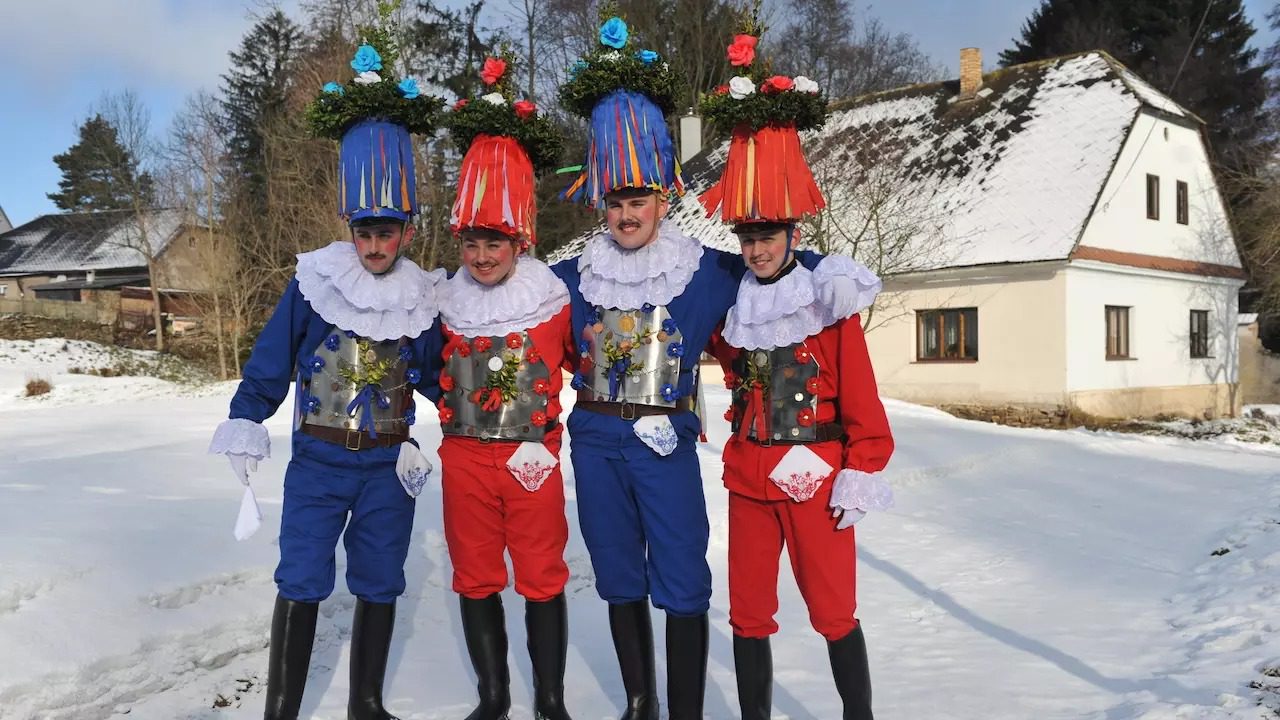The inhabitants of Hamry in the Chrudim region celebrated the carnival on Saturday. Masquerade parades, which are a regional tradition listed by UNESCO, have been held in the village since time immemorial.
However, even nowadays, masquerade parades have not turned into commercial events. There was music and dancing, but no stalls with hot punch, cakes for sale, or fairground trinkets. Still, there was plenty of food and drink.
The masqueraders, in order to bypass all the descriptive numbers in the village, set off before 8 am. First, they asked permission from the mayor, just as they did in the Austro-Hungarian era. It was only during the Second World War that the tradition was interrupted and only resumed in the 1960s. And not even the coronavirus disrupted it.
Preparations for the carnival in the village start already at harvest time. “Rye has to be cut to make skirts for the masks. Then the hall is prepared, the masks are repaired and replenished, and everything needs to be washed, ironed, and the treats cooked. Firefighters, their wives, we all help each other,” said Mayor Petr Stejskal.
Only men walk in the parade, and they are divided into black and red masks. There are chimney sweeps, straw men, Turkish men, and a woman. But Laufr commands everything. After all, he had to get up at 3:30 in the morning to get everything done and the tour started on time. It is the early morning meeting of the participants that is a carnival tradition in Hamry.
Mardi Gras was originally a three-day holiday. It is celebrated between Christmas and the Lenten season before Easter. This year, Ash Wednesday, which marks the beginning of Lent, falls on Wednesday, March 2.










Excellent article. Keep writing such kind of information on your page.
Im really impressed by your site.
Hi there, You’ve done an excellent job. I will definitely digg it and in my view suggest
to my friends. I am confident they’ll be benefited from this web
site.
Thanks for sharing your thoughts about website. Regards
I’ve read a few good stuff here. Definitely price bookmarking for revisiting.
I surprise how a lot attempt you place to create the sort of great informative website.
Wonderful blog! I found it while searching on Yahoo News.
Do you have any tips on how to get listed in Yahoo News?
I’ve been trying for a while but I never seem to get there!
Thanks
What’s up, just wanted to say, I liked this article.
It was practical. Keep on posting!
What’s up i am kavin, its my first occasion to commenting anywhere,
when i read this post i thought i could also create comment due to this good piece of
writing.
Thanks very nice blog!
I think the admin of this web site is genuinely working hard
in support of his web site, for the reason that here every material is quality based material.
When I initially commented I appear to have clicked the
-Notify me when new comments are added- checkbox and now whenever a comment is added I get 4 emails
with the same comment. There has to be an easy
method you can remove me from that service? Thanks a lot!
Valuable info. Lucky me I discovered your site by accident, and I
am surprised why this twist of fate didn’t came about in advance!
I bookmarked it.
I am really inspired with your writing talents as well as with the layout on your blog.
Is this a paid topic or did you customize it yourself? Anyway stay up the nice quality writing, it’s uncommon to peer a nice blog like this one these days..
Excellent blog you have got here.. It’s hard to find high-quality writing like yours these days.
I seriously appreciate individuals like you! Take care!!
It’s crazy that some players are willing to
leave thousands of $ on the table, but they do just
about every single day.
It’s taken on the basis of hundreds of thousands of plays, so can not replicate the
average person’s encounter.
Dear czechdaily.cz admin, You always provide clear explanations and step-by-step instructions.